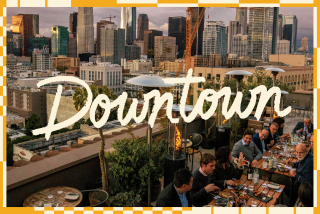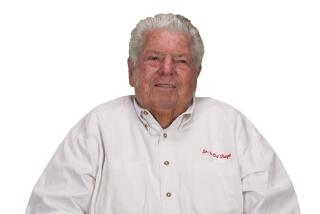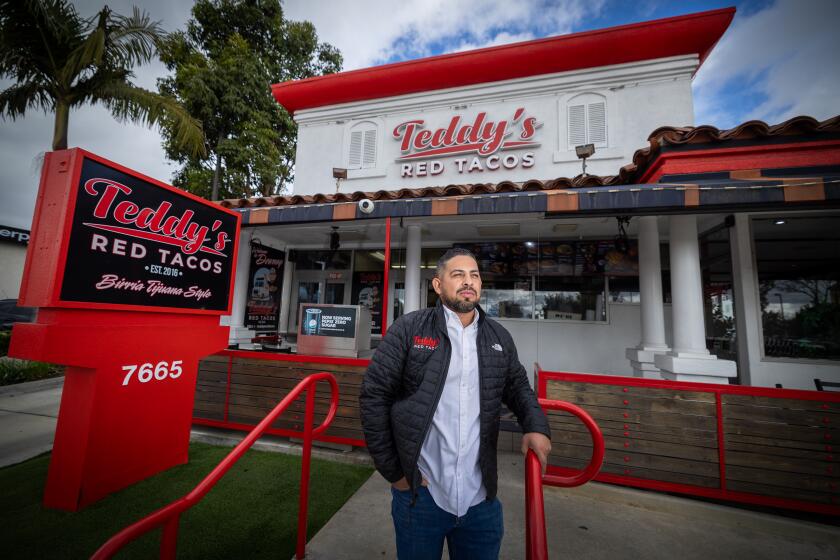Robert O. Peterson, Founder of Jack in the Box Restaurants, Dies
- Share via
SAN DIEGO — Robert Oscar Peterson, a plain-spoken, take-charge entrepreneur who founded the Jack in the Box restaurant chain and was a major benefactor for the arts, higher education and liberal political causes, died Tuesday night at age 78.
Peterson’s wife, former San Diego Mayor Maureen O’Connor, was at his bedside at their home in Point Loma when he died. He had fought leukemia for more than a decade.
“He did a lot of good in this world,” said Peterson’s longtime friend and attorney, Robert Ballantyne. “When he had an idea, he didn’t waste a lot of time discussing it. He just went ahead and did it.”
A native San Diegan, Peterson was the son of a salesman for a milk and ice cream company. His talents as an organizer and promoter became apparent when he attended San Diego State College.
Peterson founded the Collegiate Club to hold dances at Balboa Park on Friday nights and was helped by fellow students Art Linkletter, Faye Emerson and Gregory Peck. The profits allowed Peterson to pay his college expenses.
Later, he was a traveling salesman for a company that sold milkshake mixers. He founded Topsy’s drive-in restaurant in San Diego in 1941 and served as a lieutenant in naval intelligence during World War II.
After the war, Topsy’s became Oscar’s and Peterson pioneered the concept of the “drive-through,” where patrons drove away as soon as their food arrived. The idea was to make a fortune for Peterson and revolutionize the fast-food industry and the American way of eating.
In 1950 he started his first Jack in the Box restaurant and expanded the drive-through idea to include a speaker hidden inside a brightly colored plastic clown.
Because patrons did not linger, the restaurants enjoyed high volume sales and prices could be kept low. He resisted unionization but installed a profit-sharing plan for employees.
By 1967, when Peterson sold the chain to Ralston-Purina, there were 300 Jack in the Box restaurants and the drive-through idea had become an industry standard.
From hamburgers, he branched out to banking, hotels, philanthropy and civic improvement.
Although studiously avoiding publicity, he was one of a handful of civic-minded businessmen who transformed San Diego from a Navy town where the power structure was clubby and predominantly Republican and the economy was perilously dependent on military spending.
He backed reformist political candidates and greatly expanded activities to market San Diego worldwide as a vacation spot. He founded a fund-raising group that aggressively tapped private and public sources to bolster museums, theaters and individual artists.
His penchant for change, and his lack of tact in accomplishing it, earned him the enmity of some in the city’s business community. “The Establishment hates me because they don’t like the boat rocked,” Peterson said in an interview with The Times in 1982.
A registered Republican, he nonetheless supported Alan Cranston, George S. McGovern, Frank Church and the presidential campaign of Edward M. Kennedy. For his fund-raising efforts on behalf of those and other Democrats, he was named to the “enemies list” compiled by the Administration of President Richard Nixon.
Although Peterson was a supporter and contributor for three decades, Cranston said he never asked for a political favor or tried to influence a vote. He was, however, blunt when asked his opinion.
“If you made a suggestion that he didn’t like, he’d say, ‘Hell no, that’s the wrong thing to do,’ ” Cranston said.
Peterson received the City of Paris Medal of Honor for his contributions to the arts. President Lyndon Johnson named him chairman of a small business advisory committee and a lecture hall was named in his honor at UC San Diego in appreciation of his contributions.
With world-renowned fabric designer Jack Lenor Larsen, Peterson founded the New York-based American Crafts Council to promote folk art. He was also a collector with a taste for sculpture and post-Impressionist painting.
In 1977, Peterson married O’Connor, 30 years his junior, who was then finishing her second term on the San Diego City Council. Peterson’s three earlier marriages had ended in divorce.
A shrewd businessman and tough negotiator, Peterson purchased and renovated hotels such as the historic Mendocino Hotel. “He loved making deals,” Larsen said. “I think that’s what kept him going when he got so sick.”
In his 1982 interview, one of the few he granted, Peterson said: “I don’t ever want to be bored and don’t think I ever can be. There’s too much in this world and so damn little time to know it.”
Survivors include three sons, Gary, Cris and Patrick, and a daughter, Jan Alldredge, all from his marriage to Lorraine Bhalla.
Funeral services are pending.
More to Read
Eat your way across L.A.
Get our weekly Tasting Notes newsletter for reviews, news and more.
You may occasionally receive promotional content from the Los Angeles Times.










